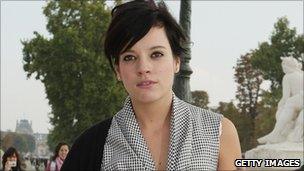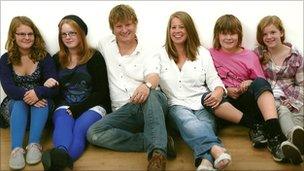The pain of miscarriage
- Published

Lily Allen has suffered a miscarriage for the second time
Lily Allen announced last week that she and her boyfriend Sam Cooper had lost their unborn baby.
The 25-year old singer was six months pregnant and had previously had a miscarriage in 2008.
It will be of little comfort to her to know that around one in five pregnancies ends before the 24th week.
This figure could be even higher because many miscarriages are thought to occur before a woman realises that she is pregnant.
At whatever stage the miscarriage occurs it is a difficult and emotional experience, heightened by the fact that there is seldom an explanation for why they happen.
For most women, a miscarriage is a one-off event and they go on to have a successful pregnancy in the future.
But around 1% of couples will experience recurrent miscarriages (the loss of three or more pregnancies in a row).
Michelle Every knows what it is like to go through the trauma of a late miscarriage.
She already knew in her heart that her baby was dead when she went for her 20-week scan.
When the scan found no heart beat, the initial shock gave way to fear as she faced the horror of being induced, going through labour and giving birth to a child who would never draw breath.
"I just got abandoned - I was left to deliver the baby on my own, with my husband, on a ward where women were having abortions as well."
"The labour was painful, made worse by the grief and the fear of what was happening to me.
"My experience of hospital was really quite negative.
"But I can see now that I had the privilege of giving birth to that child. I saw the baby, held him and was able to say goodbye."

Michelle Every and her family
Michelle and her husband Iain had four children already, aged two, four, six and seven at the time - but that didn't stop them feeling devastated.
"I felt I was good at having babies. I thought I was a baby-making machine and that made the loss very difficult to accept," she said.
They took photographs of their baby, which they hid for a year, before deciding to put them in a frame.
"After a while I grew more confident about acknowledging and talking about our baby... and that's when we gave him a name, Arthur."
The most difficult thing was having to tell the children that there wasn't going to be a baby, she says.
"The kids had a moment of connection with the baby at the first scan. They saw the baby waving at them from my tummy."
"I don't think you ever get over losing a baby. Not knowing why it's happened makes it really hard to deal with."
Michelle now volunteers as an emotional carer for people going through miscarriage with The Miscarriage Association.
Women who have miscarriages in the middle trimester when the baby is nearly viable, but not legally viable, don't feel they get enough support, she explains.
"There are not enough staff to help them and as a result they feel they are going through it alone.
"My role is to be there for them and give them permission to grieve."
- Published6 August 2010
- Published6 August 2010